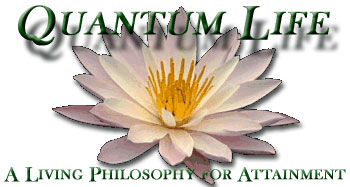of USAWKF
- Volume One
- Volume Two
- Volume Three
- What is Daimoku
- On Becoming
- The Buddha's Work
- A Debt of Gratitude
- Longing for Masters
- Samsara and the Ego
- Samsaric Opportunity
- Singlemindedly desire to see the Buddha
- The Two Great Concepts
- Pain of ending friendships
- The Buddha's Teaching
- Broad Study but Focused Practice
- Merits of Teaching the Law
The Samsaric Opportunity
Of course, your statements are the essential teachings that justify our
manifestation as human. This is why every sacred text, that is in its
original forms and not polluted by ignorance, exalts the human "instantiation"
as most rare and most valuable. It is as human sentient "beings"
in the Samsaric world where we gain the opportunity to "know"
consciousness in contrast to simple awareness without "name"
and "form". Only this experience of consciousness allows for
evaluation of "being". This is the point where my writing may
take on the character of exigency, which you are interpreting as disdain.
Since you are on the path, it is easy for you to forget that we live in
a time when a great number of people go through their entire opportunity
of life unaware of their samsaric "reality". Further, the lives
of countless people are completely ruled by the samsaric. Many, though
perhaps a small percentage, but still many are seeking answers or understanding
of what they do not "know" but sense is incomplete in their
life. For many in the samsaric delusion, there is a constant dissatisfaction
that leads to questions. It is to those that I direct most of my writings,
though not all.
When one becomes aware of the samsaric "reality", one is free
to act or not act based on their will and conscience. This is more to
your point, where the samsaric world can actually function as "support"
and exhortation to the effort of awakening. This, in point of fact, is
the entire stated heroic purpose of the original teachings from the Vedas
to Brahma and later to Buddhism, which, over time all suffered from degraded
interpretations and folklore. Taoism, Confucianism, and even a "retro"
Zen are more examples. Even Tibetan Buddhism went by way of tremendous
esotericism before turning back into Mahayana and Hiniyana texts to find
core teaching. My point here is that the teaching itself followed the
course of the samsaric delusion. The import of all this is that the primary
objective is susceptible to delusion if the "path" is forgotten
in the zealousness of the goal.
To be "stuck" in the samsaric world is truly to be disdained,
would you not agree? I remember the trepidation you experienced at the
prospect of your "return" to the day-to-day "career"
and political arena at the time you left Costa Rica. You were consumed
with anxieties and concerns. You eventually worked through those anxieties
and found a "balance" with your unshakable determination to
"free" yourself of the samsaric while operating your life within
it. This is no small realization and represents an awakening in itself.
I only remind you of this so that you also consider that many in your
daily life encounters have had no such awakening, even if some profess
to "understand" it.
I hope this helps define my position and provides some support for your
continuing efforts.
In addition, I should take this opportunity to remind that Buddhism, like
no other philosophy or teaching, is unique in its posture. That is, one
must look at the position of the teachings as well as the origin of the
teachings to appreciate the posture. Firstly, the founder of Buddhism
lived in a caste system at a time when older teachings of consciousness
had become weak, defiled, and diluted. Second, this founder was born to
the royal caste and further trained as a warrior in the martial arts.
Prince Siddhartha was a warrior. His awakening, after renouncing his royal
position, however never denying his nobility, came as a result of tremendous
dedication and effort. The effort no less, of nobility, and a warrior.
The "bonds" of attachment to the Samsaric "reality"
are strong in the extreme. It is in fact rare to find those with the strength
to confront and challenge those bonds. Just look at the world around you
and see the myriad examples of addiction for a small point of reference.
In our present age of delusion, there is constant bombardment to reinforce
these bonds, leading us from the simple program of buying what we do not
need, all the way to war and the threat of nuclear annihilation. These
are "real" threats, which are borne of the Samsaric "reality".
In the Buddha's teaching, the posture is very clear: that this Samsaric
world requires of us the spirit of a warrior, of noble charge. To overcome
the delusions of Samsara and to become "Masters" of Samsara
is the only way to "Awaken".
For my part, I can also see the opposing posture, which prevails in our
time. There are in countless forms from religion to corporate rhetoric
to politic, the systematic "preaching" to those for whom direction
is lost, that "Everything is OK", "That all suffering and
delusion in whatever form you experience it is your birthright",
"That misery and misunderstanding are your opportunity to 'give-up!'",
That some "other" power, person, deity, cone, gem, comet, Kool-Aid,
whatever, will save you, judge you, coddle you. We are barraged with rhetoric
that exhorts all people to "accept" their punishment and rejoice
in their plight! Every day billions of people are being "taught"
to go willingly into that good night! Make no mistake; this is the enemy!
It is the cause of all suffering in the "world". A world as
you suggest, has plenty of illusory challenges to challenge our nature.
The attachments to Samsara are substantial, but the propaganda to entrench
it leads to extinction! Samsaric extinction not awakened extinction. This
would then end our ability to awaken, would it not? And this is why the
posture, the warrior spirit. This noble task for the self, may seem elitist
and aristocratic, and actually may well be, but the achievement brings
with it the irradiation of all those around it. In this regard, "Awakening"
is deeply compassionate and larger than self. This is the interpreted
"humanitarian" label affixed to Buddhism today. But it is not
a slavish humanitarianism, or a pacifism that is the construct of Buddhism.
Rather, these are "side effects" of the practice of ascesis.
Just as the yoga you practice has its roots in the Vedic and Brahma (not
Brahman) texts, later deluded in Hinduism, are noble and aristocratic
pursuits, so is Buddhism.
I trust I have not overstated the matter. Simply to say that Buddhism
maintains "disdain" for the Samsaric "reality" would
condemn Buddhism to an opinion. Buddhism in fact, is a contemplative science;
requiring deep investigative powers and repeatable results with clear
objectives, methods, and a priori.
When obstacles are clearly identified in any discipline, they require labelling, understanding, and methodologies commensurate with their surmounting. As in any science, grey areas are not allowed or heavily disfavoured. This is not disdain; it is outright antithetical and opposed to results. I believe this is the posture of Buddhist contemplative science and all teachings leading to awakened reality. To "re-enter" into one's life with a clear "vision" and liberated from the samsaric, is the only objective of Buddhist practice.
With great appreciation,
Reverend Sylvain Nyudo
BACKGROUND
After writing the essay "On Becoming", reverend Sylvain sent out drafts to a few students, as he often does, to share the ideas and teachings of Buddhism. Occasionally, some students respond with challenges or questions. Below is the original response.
----- Original Message -----
From: James Todaro
Sent: Wednesday, April 26, 2006 9:10 AM
Subject: metaphors
Sifu...I have been pondering this samsaric world we live in quite oft
of late. You speak of it with such disdain, and I can see how it has many
characteristics that, for the enlightened, are undesirable, but is it
not also a necessary evil? For only through knowledge of what it is can
we move away from it. And we can only have knowledge of what it is through
experience. For if temperature never changed the concept of hot and cold
would be indescribable. Such is the way of the samsaric world. It is our
experiences in this world that gives rise to our true definition and furthermore
will. Without will we would not be able to push through this world into
the absolute. I believe that only through becoming wholly defined can
we lose definition and become absolute. This of course requires will to
break away from this thing (the samsaric world) which we can only move
away from if we know what it is we are moving away from.
I think by building powerful metaphors (through language, art, etc) we
can more accurately describe what it is, these things in which we move
from and towards. By clearly delineating ideas and definitions we give
rise to what it is we try to define. It is the charge of the sage, of
the enlightened to build these metaphors plainly, so that those who do
not have the privilege of meditation and concentration, who have not communed
with the universal spirit or attained samadhi, can through these metaphors
gain a greater understanding of what it is, see some magic in this mundane
world, and spark some fire in their inner will (spirit), which will eventually
and inevitably end lead to their attainment of samadhi in this lifetime.
I hope this came out right; it always seems to sound better in my head.
Peace love and the pursuit of understanding
James












